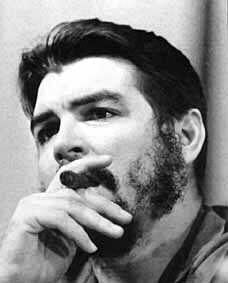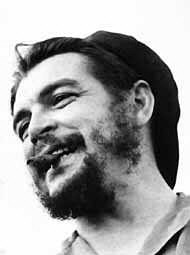GRANMA INTERNATIONAL 1998. ELECTRONIC EDITION.
Havana, Cuba
CHE THE
COMMUNICATOR
A
death
threat |

|
BY GABRIEL MOLINA
A deathly silence invaded
Prensa Latina's spacious newspaper office that morning in 1959, when the door to the
editor's office opened and a voice was heard over the habitual noise:
"Molina, I'm going to kill you!"
It was the voice of Che Guevara, who entered followed by Masetti...
Brilliant multifaceted and single-faceted figures have always existed
and always will, but few have been as versatile and apparently contradictory as Che: he
was a doctor and an economist, a researcher and a guerrilla commander, a political leader
and a diplomat, a practical man and a theorist, a poet and a mathematician, an athlete and
a thinker, and even a photographer and a journalist.

It is a fact that he was a professional in everything, because he really
undertook everything with an "artist's delight."
His first and more professional contact with the press was in Mexico,
when he worked as a photographer for the Agencia Latina, based in Buenos Aires during the
Peronist period. That Latin Americanist dream obsessed him all his life. It could be said
that he realized it in Cuba with Prensa Latina.
Destiny had it that the few journalists and very few Latin Americans who
were able to go to the Sierra Maestra to do stories on the Rebel Army included another
dreamer by the name of Jorge Ricardo Masetti. I said to write an article, because
fortunately there were more reporters serving as soldiers in the Sierra Maestra - and in
the cities and plains - than those who could get up there exclusively as journalists. Che
himself was a journalist there, with the daily El Cubano Libre and Radio Rebelde, both of
which he founded.
Fidel, Che and Masetti organized the news agency Prensa Latina S.A.,
whose first editor, logically, was Masetti. Its president was a Mexican entrepreneur, and
its greatest inspiration, although he didn't figure in any way, was Che Guevara, who often
visited the agency. He spent many hours talking with Masetti, among other things, on what
was happening in the press and the agency's progress. He knew the correspondents or those
aspiring to be correspondents.
Apart from that, Che was an excellent feature writer. The first and
best-known work on the Sierra Maestra was his book Guerra de Guerrillas (Guerrilla
Warfare). And in those early years of the Revolution, his articles in Verde Olivo, under
the pseudonym "El Francotirador" (The Sharpshooter), were frequent. Along with
many labors he undertook simultaneously, he was instruction head of the Rebel Army and, in
this capacity, worked directly with the magazine. He also wrote for the daily Combate,
organ of the Revolutionary Directorate, and for Hoy, the Popular Socialist Party
newspaper.
In spite of his aura of a difficult, inaccessible personality, many
journalists can testify that among the revolutionary leaders, he was surpassed only by
Fidel in terms of attention; in his own style, like when he made us participate in
productive work before giving us information.
I personally recall with deep pleasure that the first really significant
interview I did after the triumph of the Revolution was precisely with Che in his office
in La Cabaña (the old fort housing the Rebel Army). I had met him a few days previously,
when I visited him with Commander Guillermo Jiménez, assistant editor of Combate, and it
was Che who introduced us to Rogelio Acevedo, the then beardless, long-haired captain.
It's a fact that one was predisposed in favor of Che. And that feeling, far from being
deceptive at close quarters, was impressive.
When right-wing elements attempted to suppress the daily Combate which,
unexpectedly, demonstrated a clear left-wing position - far more so than Revolution,
edited by Carlos Franqui - we informed him that they didn't want to use Combate for state
advertising. Che called Guillermo Jiménez, René Anillo and myself into his office at
midnight, at the National Institute of Agrarian Reform (INRA), which Che also headed, and
we talked there for a long time.
A few days later, the boycott of Combate ended, which gave faith to the extent of his
attentiveness.

I understood that from the day on which he left me cold, threatening to
shoot me down in the spacious Prensa Latina newspaper office, which is a story I've never
told before.
I was facing him and all the journalists waited expectantly. I got up and moved towards
him, asking him why he wanted to do that.
Che Guevara also advanced towards me. I felt the tension increase in the
air when he answered, seemingly angrily: "Because of what you published in
Combate!"
Still going towards him, I asked if I'd written something untrue or inaccurate.
"No. It was accurate. But you put a really big headline on the front page."
"Didn't it deserve it?" he asked.
By this time, we were face-to-face, almost touching. Then he lowered his
voice so that the others wouldn't hear and said to me, smiling and placing his hand on my
shoulder:
"The thing is, I said things that the Fidel thinks but can't say. And somebody could
believe that I think differently than he does."
After that episode, I smiled to myself when the "outside" press stated that Che
had left Cuba because of discrepancies with Fidel.
That unity with Fidel in terms of thought and action is eternal
and warranted me a "death threat." |